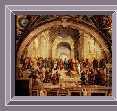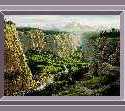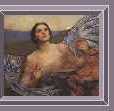The Way it Was?
Gardner Dozois and Stanley Schmidt (Ed.)
With an introduction by Shelly Shapiro, Roads Not Taken is a wonderful primer on Alternate History, with contributions from Harry Turtledove, Gene Wolfe, and Robert Silverberg.
"Must and Shall," by Harry Turtledove -- the early assasination of Lincoln leads to Hannibal Hamlin's becoming president and much stricter measures against the South, which remains rebellious even into WWII. Good history, good story. One scene in a New Orleans dance hall -- in the line of duty -- that bothers the character's conscience.
"An Outpost of the Empire," by Robert Silverberg -- the one where Rome never fell. Hardly any history, no real story, a pointless sexual relationship that goes nowhere.
"We Could Do Worse," by Gregory Benford. McCarthy becomes president. Fairly good history, not much story.
"Over There," by Mike Resnick. Roosevelt takes the reconstituted Rough Riders into WWII, with predictable results. Pretty good history, somewhat of a dark ending but doesn't totally discount the idea of heroism.
"Ink From the New Moon," by A. A. Attanasio. Columbus runs into the Chinese who've beaten him to the New World. Not much history, though what there is is good; confusing storyline.
"Southpaw," by Bruce McAllister. Castro as a baseball player. I guess okay history, but no real story. Mild sexual scene.
"The West Is Red," by Greg Costikyan. Socialism works, capitalism doesn't, the upheavals in the US that result. Interesting premise well worked out, not much story, confusing ending, unnecessary sexual relationship.
"The Forest of Time," by Michael F. Flynn. A timetraveler lands in a world where the states never united. Interesting background on how time travel might work. Good working-out of the historical starting-point. Good story; somewhat confusing ending.
"Aristotle and the Gun," by L. Sprague de Camp. A disgruntled scientist tries to get Aristotle to jump the gun, so to speak, on modern scientific thinking. Good history, good story, unexpected ending, but it works.
"How I Lost the Second World War and Helped Turn Back the German Invasion," by Gene Wolf. Good history well worked in, good story, although the multiple layers of the story can be confusing at first.
Connie Willis
The author of several well-received books, including Bellwether, Ms. Willis has become an alternate history force to be reckoned with!
To Say Nothing of the Dog is not precisely alternate history; the characters are running back and forth between three or more completely different eras, and their own timeline is futuristic rather than historical. But the story does explore the whys and wherefores of historical happenings and, time travel being involved, the threat of changing the course of history hangs constantly over their heads, which makes it close enough for convenience.
Literarily, To Say Nothing of the Dog is excellent. The plot is involved and suspenseful, borrowing from traditional mystery novels, time travel tales, and Victorian humor, to say nothing of the dog. (The title refers to Jerome K. Jerome's Three Men in a Boat (To Say Nothing of the Dog), which is a fairly constant allusion throughtout the book.) The literary allusions and plot connections buried throughout are entertaining and make for interesting rereadings, but catching them isn't necessary to understanding and enjoyment. The characters are well-drawn and likeable; the world of 2057 is believable and entertaining; and the ending is, in the best mystery tradition, a surprise that was there all along.
Morally, To Say Nothing of the Dog is a welcome relief from much of the available sci-fi/fantasy. The entire plot centers around the rebuilding of "an archaic symbol of an outmoded religion" -- Canterbury Cathedral -- against the united skepticism of most of the world. Surprisingly or not, the world turns out to be wrong. There is, admittedly, a bedroom scene involving the hero and heroine -- in which they remain clad and discuss mystery novels, cats, and historical repercussions. They're in the Victorian era, after all. In the end the book turns out to be, as one of the characters says, "nothing but an argument for a Grand Design" -- but one that is highly entertaining and well worth reading.
(c) 2000

 Roads Not Taken
Roads Not Taken
Literary Quality:
Thoughts from Colleen McAndrew
Christian Morality: Harmless
Age Appropriateness: Pre-Teen/Teenager To Say Nothing of the Dog
To Say Nothing of the Dog
Literary Quality:
Thoughts from Colleen McAndrew
Christian Morality: Good/Harmless
Age Appropriateness: Pre-Teen/Teenager





Updated 6 October, 2000
All Rights Held by the Author.
No part of these pages may be used or copied without express permission of the author.
